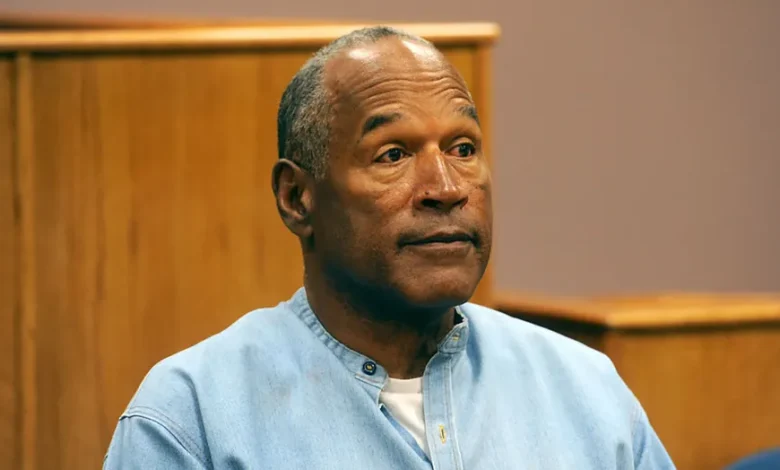The OJ Simpson Last Words: A Reflection on a Controversial Legacy

Introduction to O.J. Simpson and His Legacy
The OJ Simpson Last Words Orenthal James Simpson, commonly known as O.J. Simpson, rose to fame not only for his remarkable athletic prowess but also for his significant presence in the world of entertainment and media. Born on July 9, 1947, in San Francisco, California, Simpson began his journey in sports, notably excelling in American football during his collegiate years at the University of Southern California. He subsequently became a standout running back for the Buffalo Bills in the National Football League (NFL), setting numerous records and earning accolades, including the prestigious Heisman Trophy in 1968.
Simpson’s on-field success laid a strong foundation for his transition into a successful acting career. He became a recognizable face in Hollywood, featuring in a variety of films and television shows throughout the 1970s and 1980s. His charm and charisma on-screen contributed to a flourishing career, marking him as a prominent public figure during that era. However, the trajectory of his life took a stark turn with the events surrounding the murder of his ex-wife Nicole Brown Simpson and her friend Ron Goldman in 1994. This tragedy not only shaped his public image but also ignited one of the most sensational murder trials in American history.
The trial of O.J. Simpson captivated the nation, bringing issues of race, celebrity, and media sensationalism to the forefront of public discourse. The extensive media coverage highlighted the complexities of his personal life as well as the controversies surrounding his past. Simpson was ultimately acquitted of the charges but was later found liable for wrongful death in a civil lawsuit. These events contribute significantly to the discussions around O.J. Simpson’s last words, as they encapsulate the man caught between his celebrated career and the heavy burdens of his tumultuous personal life, marking a legacy that remains controversial to this day.
The Context of O.J. Simpson’s Last Words
To fully understand the implications and significance of O.J. Simpson’s last words, it is essential to consider the context in which they were expressed. The moment was not simply another instance of a public figure addressing the media; it unfolded at a time marked by immense personal and public scrutiny. O.J. Simpson, once a celebrated sports figure and actor, found himself enveloped in controversy following the highly publicized trial for the murders of Nicole Brown Simpson and Ron Goldman. This trial, often regarded as one of the most significant legal battles in American history, deeply influenced the surrounding atmosphere as Simpson’s words were delivered.
The last words of O.J. Simpson were uttered in a setting fraught with tension and expectation. It was a time when the nation was captivated by the courtroom drama and ensuing media frenzy. Simpson spoke these words in a televised interview, which allowed millions to witness the profound emotions and reflections he shared. This moment took place at a pivotal point in the broader narrative of his life, an echo of both triumphs and tragedies that had shaped his journey. The emotional weight of what he was about to say was palpable, laced with a mix of regret, defiance, and a yearning for redemption.
Furthermore, the psychological state of Simpson leading up to his last words is crucial for understanding their import. As he stood in front of the cameras, one could sense the inner turmoil—a man grappling with his legacy, public perception, and the haunting specters of past decisions. This moment served not only as an opportunity for reflection but also as a plea for understanding in the face of overwhelming judgment. Thus, examining the contextual backdrop reveals layers of complexity in O.J. Simpson’s last words, underscoring their significance in the narrative of his controversial legacy.
Analysis of the Last Words
O.J. Simpson’s last words reflect a complex interplay of emotions and sentiments that provide insight into his state of mind at a pivotal moment. The language he employed is notable for its mixture of defiance and vulnerability, which suggests a profound internal conflict. Through careful examination, one can trace themes of remorse, denial, and the quest for redemption woven throughout his statements. These words, perhaps intended to serve as a final testament, reveal not only personal feelings but also broader implications regarding his legacy.
In assessing the language used, one finds instances where Simpson expresses a desire for understanding, hinting at an acknowledgment of the consequences of his actions. This nuanced expression can be interpreted as a desire for reconciliation, both with himself and with society. Yet, moments of denial also punctuate his narrative, particularly in the way he frames certain actions and decisions, evoking a sense of unreconciled guilt. The dichotomy between remorse and denial serves to complicate the interpretation of his last words, painting a portrait of a man grappling with the ramifications of his past.
Underlying these sentiments is a poignant yearning for redemption. Simpson’s last words may not only reflect an acknowledgment of his shortcomings but also his hopes for forgiveness. This complex emotional tapestry speaks volumes about his understanding of the gravity of his situation. The implications of this analysis extend beyond the individual, offering a platform for a broader discourse on accountability and legacy. In essence, O.J. Simpson’s last words encapsulate a turbulent journey marked by moments of introspection, regret, and the search for a semblance of peace amidst a legacy unquestionably mired in controversy.
Public Reaction to O.J. Simpson’s Last Words
The public reaction to O.J. Simpson’s last words has been as varied and complex as his legacy itself. Following his remarks, a flurry of opinions and critiques emerged from different quarters, illustrating the deeply polarized views surrounding the figure of Simpson. Fans expressed a sense of closure, finding solace in the finality of his statements, while critics seized the opportunity to reaffirm their long-held beliefs regarding his controversial past. The divergent sentiments reflect not only Simpson’s personal narrative but also broader societal attitudes toward celebrity culture and accountability.
Family members, particularly those close to the case, shared their perspectives, noting how Simpson’s last words might resonate differently among various audiences. For some, the words served as a poignant reminder of the tragedy that engulfed the previous generations, while others viewed them as an evasion of the responsibilities tied to his legacy. In interviews, relatives emphasized the need for healing and reconciliation, suggesting that Simpson’s words could inspire dialogue rather than division. This theme intersects with legal experts’ observations on how public figures articulate their narrative in the face of adversity, often shaping public perception more than the legal intricacies of their cases.
The media played a pivotal role in amplifying the reactions to O.J. Simpson’s last words. Coverage ranged from sympathetic to critical, with various outlets dissecting every syllable of his statements. Commentators noted how media framing has the power to influence public opinion and often perpetuate either a negative or positive narrative. This dynamic illustrates the responsibility that media holds in presenting such events, as it directly affects how the public engages with Simpson’s legacy. Overall, the reaction to O.J. Simpson’s final statements showcases society’s ongoing struggle with complex figures and the ramifications of their words, further complicating the understanding of his controversial place in American history.
Comparative Analysis with Other Famous Last Words
The last words of an individual often carry significant weight, serving as a final expression of their thoughts, regrets, or beliefs. In the case of O.J. Simpson, his last words have sparked both curiosity and controversy. When juxtaposed with the last words of other famed personalities, several intriguing parallels and distinctions surface. Examining these expressions provides valuable insight into how they encapsulate the legacies of their speakers.
Consider the poignant final words of Steve Jobs, who famously uttered, “Oh wow. Oh wow. Oh wow.” before passing away. Unlike Simpson’s narrative, Jobs’ words resonate with a sense of wonderment, perhaps indicative of his reflections on life and innovation. This contrast emphasizes how the emotional context surrounding an individual’s death can shape their parting remarks. While Jobs’ last words are often celebrated for their simplicity and depth, Simpson’s last words encapsulate a more complex narrative laden with controversy and personal history, reflecting the turbulent events that defined his life.
The final sentiments of other notable figures, such as Winston Churchill, whose last words reportedly included, “I’m bored with it all,” carry distinct implications about their outlook on life and mortality. Churchill’s expression denotes a sense of resignation, contrasting sharply with Simpson’s charged legacy, intertwined with themes of fame, criminal justice, and societal scrutiny. Each set of last words reveals the personality, values, and beliefs of its speaker, allowing audiences to interpret how these statements may reflect broader human experiences.
Ultimately, while O.J. Simpson’s last words may provoke a myriad of interpretations due to their controversial context, they serve as a compelling reminder of how final statements can encapsulate an individual’s life journey and enduring impact. Such comparative analyses into other figures’ last words highlight the multifaceted nature of human expression at life’s end, revealing a spectrum of emotions as varied as the individuals themselves.
Cultural Impact of O.J. Simpson’s Last Words
O.J. Simpson’s last words have transcended the immediate context of his infamous trial and have taken on a life of their own in popular culture. The remarks have been referenced in various television shows, films, and documentaries, underscoring the complex intersection of celebrity, media, and accountability. For instance, many documentaries that revisit the O.J. Simpson case often highlight his final statements, utilizing them to spark discussions about personal responsibility and the nature of fame. This phenomenon illustrates how his last words have become a cultural touchstone, inviting reflection on the broader implications of his life and actions.
Furthermore, literary analyses have emerged that dissect what Simpson’s final remarks reveal about American society’s obsession with celebrity culture. Authors and critics frequently draw parallels between his case and the public’s relentless scrutiny of figures who are both adored and vilified. His words serve as a microcosm of a larger dialogue concerning how individuals in the public eye are held accountable for their actions. Scholars argue that by examining Simpson’s last words, one can discern the societal standards of accountability that apply to celebrities versus ordinary individuals, inviting a critical examination of how fame shapes narratives of justice or injustice.
In addition to documentaries and literature, social media platforms frequently circulate quotes and analyses of O.J. Simpson’s last words, further embedding them into the fabric of contemporary discussions about celebrity and ethics. The cases discussed often ignite debates about moral responsibility and the impact of fame, highlighting how Simpson’s legacy continues to resonate in modern discourse. Therefore, his last words not only serve as an ending to a highly publicized trial but also evoke ongoing conversations about the implications of celebrity actions and the societal structures that enable and protect them.
Psychological Aspects Behind Last Words
Last words often hold a profound significance for both the individual speaking them and those who are left behind. The psychological implications surrounding the expression of final thoughts are complex and multifaceted. When faced with the imminent reality of death, individuals may feel compelled to articulate their feelings, beliefs, or regrets. This impulse can stem from a deep-seated need to communicate unresolved issues, seek forgiveness, or even provide closure to loved ones. In many cases, the gravity of the situation amplifies the emotional weight of these words, making them incredibly poignant.
From a psychological standpoint, speaking last words can serve as a means of reflection. It allows individuals to revisit pivotal moments in their lives, often leading to insights that may not have been fully realized during their lifetime. The exploration of feelings surrounding mortality can be therapeutic, enabling individuals to express thoughts that linger in their minds, such as unfulfilled dreams or unspoken affections. For O.J. Simpson, the weight of his last words may encapsulate reflections on a life surrounded by public scrutiny, tumultuous relationships, and unexpected consequences.
Sociologists also highlight how cultural and social norms shape what individuals consider worthy of expression at the end of life. In some cultures, last words are seen as paramount for legacy purposes, serving as a final transmission of values and beliefs. The societal expectations surrounding death can influence how individuals perceive their last spoken message, often amplifying its meaning. Regardless of context, last words like those attributed to O.J. Simpson encapsulate key moments in life that signal the interplay between personal experiences and broader societal narratives. Ultimately, these final expressions carry weight and can impact how one’s legacy is remembered and interpreted by others.
Lessons from O.J. Simpson’s Story
The life and legacy of O.J. Simpson serve as a profound illustration of the complexities that arise from fame, accountability, and personal redemption. While he initially captured the American public’s heart as a compelling athlete and charismatic personality, his life later unraveled amidst controversy, particularly concerning his highly publicized trial for the murder of Nicole Brown Simpson and Ron Goldman. Simpson’s last words, often reflective of regret and a desire for understanding, open a dialogue on the importance of personal accountability. They remind us that even those who attain celebrity status are ultimately responsible for their actions.
One crucial lesson derived from Simpson’s tumultuous journey is the perils of unchecked fame. Many public figures face the challenge of navigating their identities amidst constant scrutiny. Simpson’s narrative prompts a reflection on the pressures that accompany success and their potential consequences on personal behavior. The desperation for validation can lead people to make poor choices. It is essential to constantly ground oneself, irrespective of societal perceptions, fostering an environment where accountability prevails over indulgence.
Forgiveness also emerges as a prominent theme in Simpson’s story, particularly when considering his relationships with family and friends. His experiences underscore the complexity of human relationships and the necessity of confronting one’s past. Simpson’s ability to express vulnerability in his last words indicates a hunger for empathy and connection, illustrating that the journey towards self-forgiveness and reconciliation is a significant aspect of the human experience. In understanding the layers of Simpson’s life, readers can take away that regardless of one’s status, acknowledging one’s faults and seeking forgiveness can lead to personal growth and healing—lessons that resonate well beyond the world of celebrity culture.
Conclusion: The Enduring Story of O.J. Simpson
The narrative surrounding O.J. Simpson remains one of the most controversial in American history. His actions, public persona, and the subsequent legal battles have carved a distinct space in the cultural lexicon. As we reflect on O.J. Simpson’s last words and the weight they carry, it becomes clear that they are not merely a final utterance but a lens through which we can examine his complex legacy. The final words attributed to him resonate with themes of regret, defiance, and ambiguity, prompting audiences to consider the multitude of interpretations that can arise from a single statement.
Simpson’s life encapsulates the rise and fall of a public figure who once stood as a symbol of athletic excellence and later became embroiled in scandal and controversy. His last words serve as a reminder of the duality of human nature—the juxtaposition of glory against personal shortcomings. In conversing about his last words, we not only remember the man but also confront uncomfortable truths about fame, accountability, and morality. This connection invites deeper reflection on how words can echo beyond their immediate context, influencing perceptions and narratives long after the speaker has departed.
As readers ponder OJ Simpson Last Words, there is an encouragement to reflect on their own lives and the legacies they wish to leave. Communications at pivotal moments often carry profound significance, shaping not only personal legacies but also the memories held by others. Ultimately, O.J. Simpson’s story serves as a crucial reminder that how one is remembered and the words that encapsulate that memory can have enduring impacts, reinforcing the importance of thoughtful communication in our own lives.
You May Also Read This Usaworldtoday.




